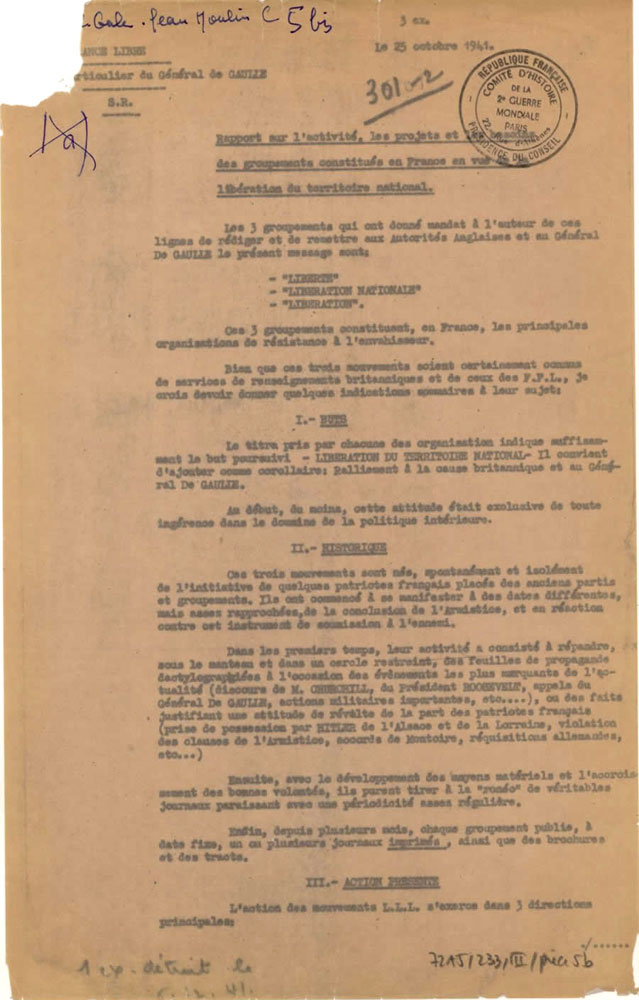Rapport de Jean Moulin, 25 octobre 1941
Légende :
Retranscription dactylographiée à Londres le 25 octobre 1941 du rapport de Jean Moulin remis la veille sur l’activité, les projets et les besoins des groupements constitués en France en vue de la libération du territoire national.
Jean Moulin’s Report, October 25th 1941
A typed transcription from London on October 25th 1941 of the report that Jean Moulin delivered on the activities, projects and needs of the groups formed in France for the liberation of the country.
Genre : Image
Type : Rapport dactylographié
Source : © Archives nationales, 72AJ/233/II Droits réservés
Détails techniques :
Rapport dactylographié de 9 pages
Date document : 25 octobre 1941
Analyse média
Révoqué par Vichy le 2 novembre 1940, Jean Moulin cherche un moyen de rejoindre Londres. En attendant, il se lance dans une enquête sur les organisations de résistance essentiellement en zone non occupée. Cette enquête aboutit à l’élaboration de ce rapport rédigé à Lisbonne en octobre 1941. Jean Moulin y présente les trois principales organisations de résistance de zone non occupée par lesquelles il dit avoir été mandaté : Liberté, Libération Nationale et Libération (qu'il surnomme "LLL"). Il retrace leur historique, souligne leur renforcement – dont témoigne la forme de plus en plus aboutie de leurs instruments de propagande – et fait part de leur volonté d’établir le contact avec Londres et de leurs efforts pour coordonner leur action.
Du 12 septembre au 19 octobre 1941, Jean Moulin se trouve à Lisbonne où il entre en contact avec les Britanniques qui l’acheminent en Angleterre le 20 octobre. Après interrogatoire, il est présenté le 24 au colonel Passy, chef du Service de renseignement, à qui il remet un exemplaire de son rapport qu’il a rédigé à Lisbonne. Le document présenté ici est la version que Passy fait dactylographier le 25 octobre. D’un côté, les trois grands mouvements de zone Sud cherchent à unir leurs forces et à entrer en contact avec Londres. De l’autre côté, le BCRA cherche à établir le contact avec les organisations de résistance mais sans grand succès malgré plusieurs tentatives. A la lecture de ce rapport, les responsables de la France libre comprennent tout l’intérêt qu’ils ont à confier une mission de liaison militaire à Jean Moulin.
Dismissed from his position by the Vichy government on November 2nd 1940, Jean Moulin searched for the means to go to London. While he waited, he launched an inquiry for the important resistance organizations in the unoccupied zone. This questionnaire provided the foundation for the report he would compose in Lisbon in 1941. There, Jean Moulin presented the report to the three principle resistance organizations in the unoccupied zone and as a result, he was appointed messenger for the movements: Libérté, Libération Nationale and Libération (nicknamed "LLL"). He retraced their history, stressing their growing strength – as shown by their increasing accomplishments achieved through propaganda – and merged their desire for London contact with their efforts to coordinate action.
From September 12th to October 19th 1941, Jean Moulin found himself in Lisbon where he made contact with the British who brought him to England on October 20th. After an interrogation, he was presented on the 24th of the month to Colonel Passy, the head of the Intelligence Service, to whom he gave the report he had written in Lisbon. The document presented here is the version that Passy typed on October 25th. On one side, the three large movements of the South Zone wanted to unite their forces and make contact with London. On the other hand, the BCRA sought to establish contact with other resistance organizations, although they met with no success despite many attempts. At the reading of the report, officials of France libre understood these interests and entrusted Jean Moulin as a military liaison.
Source : http://www.appeldu18juin70eme.org/tresorsdarchive/
Traduction : Gabrielle Ciceri



 Voir le bloc-notes
()
Voir le bloc-notes
()